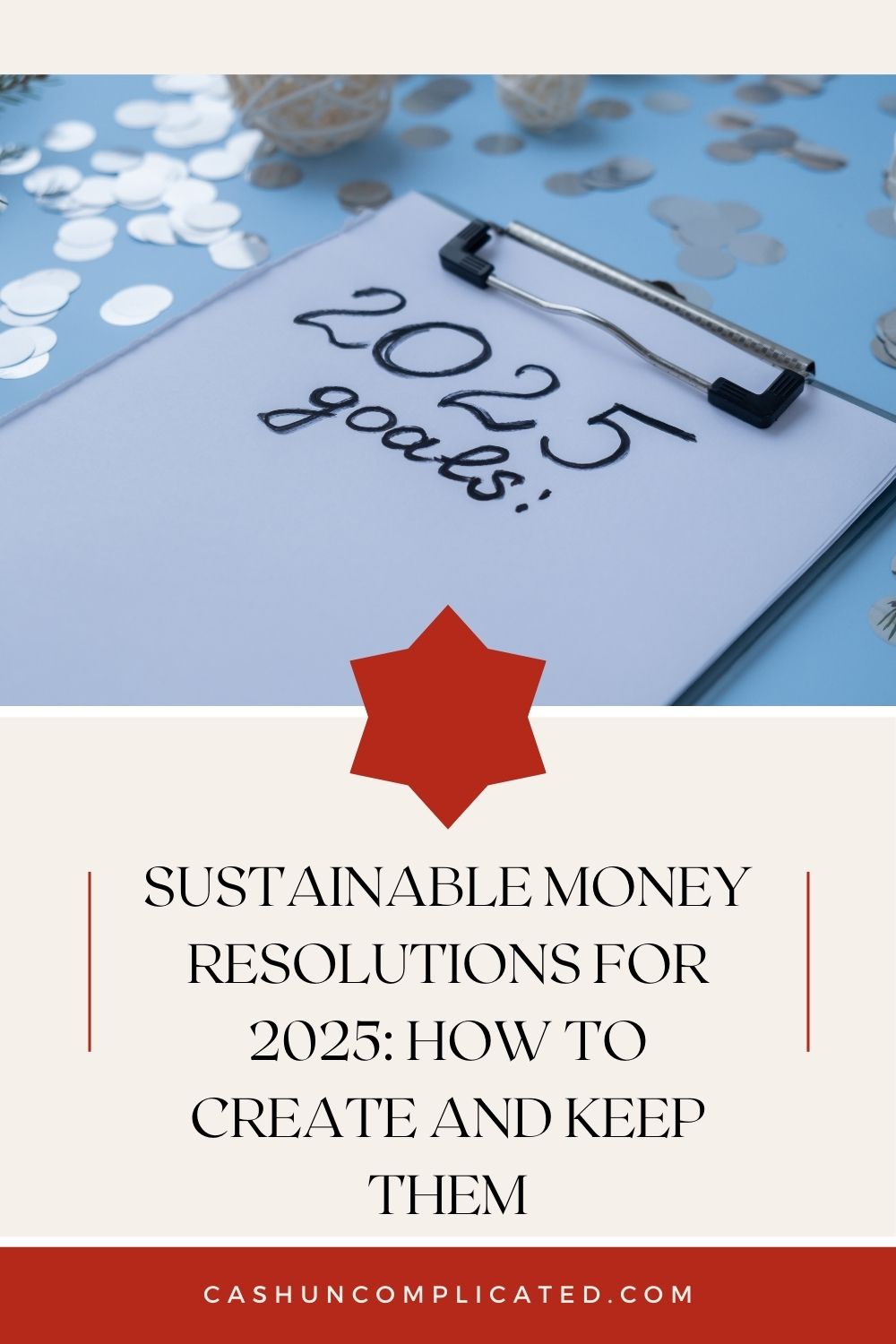As we enter the second week of 2025, many of us are hyper focused on our 2025 New Year’s Resolutions. Whether it be health, wellness, career, family, or money resolutions–they have to be sustainable. That’s exactly what this post is going to be about–how to keep and create sustainable money resolutions.
Why is Sustainability So Important?
If resolutions aren’t sustainable, we aren’t going to keep them. It doesn’t matter if it’s career related, eating healthier, money, or something else. Sustainability wins and the quick crash diets fail.
The crash diets might create momentary wins but they don’t last. Oftentimes people actually get worse afterwards. For example, someone depriving themself of spending any money for a month like “No Spend January”, might completely lose it in February and March.
Related: Why I Don’t Take Part in No Spend January
How to Create and Keep Sustainable Money Resolutions
Here’s how to create and keep sustainable money resolutions. This post comes from years of initial failures followed by years of successful resolutions so I’m talking from my own experiences. It doesn’t matter what your money resolution is, these ideas will work for plans of all shapes and sizes.
Number 1: If It Feels Like Deprivation, It’s Probably Going to Fail
If one or several of your money resolutions feels like deprivation, it’s probably going to fail. For the simple reason that deprivation is almost never sustainable.
One of the secrets to goals is there is no end point. There may be a reaching of the goal, but that’s not the end point. Goals are more about what you become in the process than the final destination.
While it may seem possible to sprint towards a money resolution and then stop when you get there, that’s not the way life works. For example, someone who sets a resolution to get out of $5,000 in credit card debt. It doesn’t work to sprint your way out of debt, succeed, then go on a spending splurge that gets you right back into debt.
The sprint to get out of debt probably felt like deprivation which is why the person fell back into it after the initial success. The same thing is seen for health and wellness goals where someone works out hard and eats well for a few months, only to fall back into old habits.
So if your resolution or goal feels like deprivation, that’s because they probably are. Find a way to make it less about deprivation, and more about sustainability.
Number 2: There Should be Some Discomfort, But Not Begging For It to be Over
Every goal should scare you a little bit. Can I really do it? Am I capable? Do I really want to? That’s what worthy goals are supposed to feel like.
Where goals transition to the unsustainable is when you ask questions or make statements like:
- When am I finally done?
- I can’t wait until this is finally over!
- When can I go back to normal?
Questioning yourself is normal but just wanting to be “done with it” is not a long-term plan. There is no “done” with a good financial plan, exercise routine, or healthy eating. They are a way of life.
The only exceptions I make to this rule is when certain times of the year are predictably more busy than other times.
For example, a CPA during tax season, an athlete during the playoffs, a small business owner during the holiday shopping season. These times of the year are all predictable and part of a yearly plan.
Number 3: Create a Plan That Works For You
For a plan to be sustainable, it has to work for you. It must be something you can do day in and day out.
If you’re someone who loves to eat out at a good restaurant a couple times a month, completely cutting out restaurants for multiple months isn’t going to work. Someone who loves to travel a few times per year who all of a sudden completely cuts it out is going to feel deprived and struggle with the new lifestyle.
Likewise, a family of four who likes to go visit the grandparents every few months out of state isn’t going to be happy giving that up cold turkey.
The plan has to work for you and your family. You can’t cut out core things in your life and expect it to work. This is where a good plan comes into play.
If you’re trying to invest or save more money, get out of debt, etc., someone who loves to go out to eat might go out less and replace it with cooking a nice meal. A person who loves to travel might replace one vacation with a staycation or stay in less expensive hotels at least 50 percent of the time.
There are lots of plans that work and many ways to modify your life. You just have to find ones that work for you.
Number 4: Set up Systems and Structure to Help You
James Clear wrote that you do not rise to the level of your goals. You fall to the level of your systems. This is some of the wisest advice I’ve heard on the topic.
Here are some examples of how to implement this advice for your money resolutions.
- Pay yourself first
- Automate
- Set up accounts for various wants and needs
Once you set these things up, you don’t have to worry about willpower or sticking to it. It’s already done for you because you’ve set it up.
Setting up systems effectively cuts out decision making because the system puts your behavior on autopilot.
Number 5: Put Yourself Around Supportive People
Jim Rohn has a famous quote: “You are the average of the five people you spend the most time with.” This quote rings true in all facets of life, both good and bad.
- If you spend your time with people who are interested in advancing their money goals, you will do the same.
- Those who spend most of their time with people who party and do drugs will probably party and do drugs.
- People hanging around others who go to the gym and eat healthy will likely go to the gym and eat healthy.
Think about it this way. You and a group of your close friends go to a swimming pool. All of them put on their goggles, jump in the pool, and start doing laps at a fast pace. How weird would it be for you to hang out on the pool deck, light up a cigarette, and crack open a beer. Weird, right?
Humans are social creatures and tend to do what their close friends are doing. One of the easiest ways to set yourself up for success is to hang around people with the same goals as you.
Number 6: Allow Yourself to Make a Mistake
One of the most common causes for people to give up their financial resolutions, or any other goal, is the tendency to think you have to be perfect.
For example, someone who resolves to go to the gym every day misses Wednesday because of a late meeting. The natural tendency is to then miss Thursday because you already blew the week. There’s no way you can work out everyday that week so why bother with Thursday?
Where the best way to do it is to allow yourself to make a mistake. In this same scenario, miss the gym Wednesday but then get right back at it and go to the gym Thursday. Yes, you missed a day but you’re back in the groove the next day and the days after.
Same thing for money resolutions. So you made a bad purchase Tuesday night. That doesn’t mean you should go out and blow your budget the rest of the week. Acknowledge you did something you wished you didn’t and immediately get back on track the next day.
One small mistake won’t kill your money resolutions but repeatedly making small mistakes will. Allow yourself to make the occasional mistake and recover quickly.
Number 7: Stick to Your Values
The North Star for everyone is their values. Always follow your values. Identify your money values and stick to them.
This is what I refer to as value-based spending. Spend on necessities and what you truly value, cut out the rest.
If you value health and fitness, spend on gym memberships and equipment. If you would rather mountain bike that ever set foot in a gym, buy a mountain bike.
Someone who loves to travel should spend their discretionary income on taking trips. A foodie would spend their money on trying new restaurants. So on and so forth.
Stick to spending on your values and don’t get trapped into putting your hard earned money into other things.
Conclusion
Achieving your money resolutions is difficult but certainly not impossible. Take it from me, I’ve failed at many resolutions and succeeded in many more. Follow these tips and your chances will be greatly increased.
- Number 1: If It Feels Like Deprivation, It’s Probably Going to Fail
- Number 2: There Should be Some Uncomfortableness, But Not Extreme
- Number 3: Create a Plan That Works For You
- Number 4: Set up Systems and Structure to Help You
- Number 5: Put Yourself Around Supportive People
- Number 6: Allow Yourself to Make a Mistake
- Number 7: Stick to Your Values
How do you keep your money resolutions?








